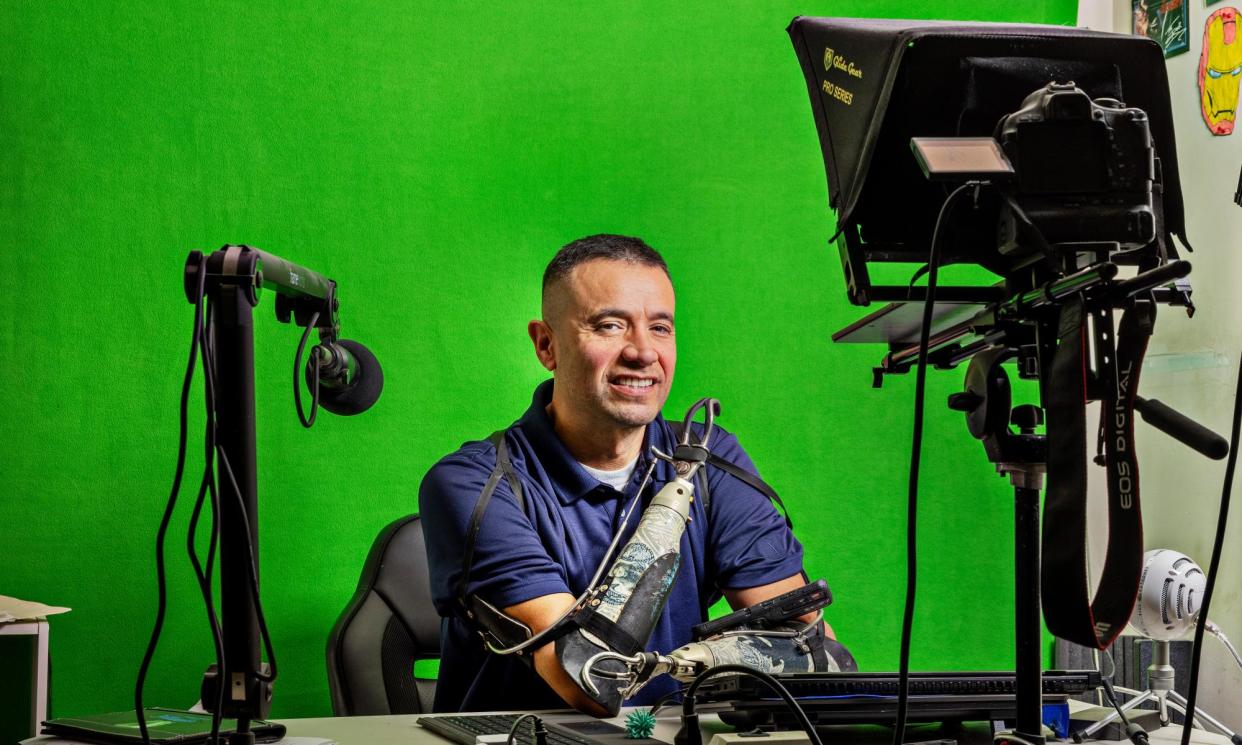Experience: I lost my hands after being electrocuted by 14,400 volts

In 2010, I’d been working in Colorado, in one of the world’s most dangerous professions. As a lineman, it was my job to maintain and repair electrical power lines. I knew the risks, and had already witnessed them when my brother, who worked in the same field, lost his right arm in 2008. That same accident saw a colleague lose his life. I began to question whether it was a career I should stay in. I told myself I wasn’t a quitter, but after 13 December 2010, everything changed for me.
On that day, I was standing on a platform, working on a power line. I was cutting a wire to size and wanted to throw some scrap on to the ground. My colleague was down below me, and I didn’t want to hit him in the head, so I spun around to throw the piece elsewhere. The power line above was protected by a plastic insulating cover, I was being very careful, but in that tiny second the wire touched a part that wasn’t wrapped up. Then 14,400 volts charged through my body. Everything went black.
I woke up feeling disoriented, hearing the whirring of helicopter blades, with no idea of what had just happened. I felt as if I was in a dream. Then I felt firm hands on my shoulders and realised I was lying down, strapped to a board, surrounded by paramedics. “Why are my hands burning?” was all I could ask. The helicopter was going to transport me to hospital, but I was too discombobulated to understand what was happening and blacked out again.
My accident has taught me that I am so much more than my hands, or my work
I woke up in hospital a day later and couldn’t feel my hands. After three days, I learned that there was no blood circulation at all in my hands due to severe burns, and they were infected. The doctors told me there was a risk of the infection spreading to other parts of my body if I kept my hands. I wanted to live, so there was no option: my hands, and parts of my arm six inches from the elbow, were removed. I stayed in hospital for a month to recover, then was moved to another hospital for rehabilitation for a month.
I felt really numb the whole hospital stay. The fact that I’m a double-handed amputee is pretty rare: not many occupational therapists have worked with people like me and we had to keep looking things up online together.
It was only as my discharge date came near, when I had a dream about needing to turn the light switch on, that it hit me. That day when I went to physical therapy, the therapist noticed I was looking pale and asked if I wanted help from a psychologist. That was the first time I’d been able to speak to someone about how I was feeling. I felt so alone, as if I was the only person in the world who didn’t have any hands. I realised I could never go back to life as I knew it. My family was devastated. My brother took it particularly hard because he felt as if it was his fault that I had gone to work in the same field as him.
Related: Experience: I stole a Rodin sculpture from a museum
My first week at home in Salt Lake City was incredibly difficult. I felt really depressed and did nothing but sleep. All I could think about was: how am I going to do this? Then I realised that other people in the same situation probably needed help, too. There wasn’t really anything out there for us. I started making YouTube videos under the name The No-Handed Bandit, demonstrating techniques I had figured out by myself that make my life easier. I asked my sister to film me opening a detergent bottle and took it from there. Since then, I’ve shown people how to tie their shoelaces, wipe their bottoms, use computers and touchscreens. It has really helped with my recovery as it motivates me to get up and do things, and I’ve made more than 100 videos.
I now work at an aviary near my home, helping the centre connect to underprivileged communities. I love hanging out with my family, and play basketball three times a week. It means a lot when I get messages from others telling me how much I’ve helped them. I used my hands so much for work, and my identity was built around what I did with them. My accident has taught me that I am so much more than my hands, or my work. If I could go back in time, I’d tell myself that the road will be tough, but you have every tool you need to make it through this journey and, in the end, the future is fantastic. Today, I feel incredibly blessed to be alive.
• As told to Elizabeth McCafferty
Do you have an experience to share? Email experience@theguardian.com
Comments on this piece are premoderated to ensure discussion remains on topics raised by the writer. Please be aware there may be a short delay in comments appearing on the site.


